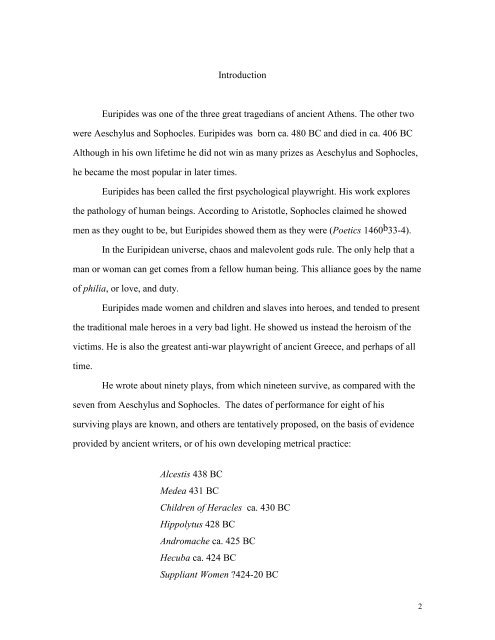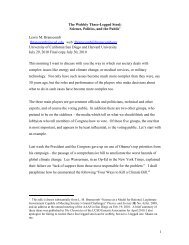Euripides' Medea Int. and Trans. by Marianne McDonald Copyright ...
Euripides' Medea Int. and Trans. by Marianne McDonald Copyright ...
Euripides' Medea Int. and Trans. by Marianne McDonald Copyright ...
You also want an ePaper? Increase the reach of your titles
YUMPU automatically turns print PDFs into web optimized ePapers that Google loves.
<strong>Int</strong>roduction<br />
Euripides was one of the three great tragedians of ancient Athens. The other two<br />
were Aeschylus <strong>and</strong> Sophocles. Euripides was born ca. 480 BC <strong>and</strong> died in ca. 406 BC<br />
Although in his own lifetime he did not win as many prizes as Aeschylus <strong>and</strong> Sophocles,<br />
he became the most popular in later times.<br />
Euripides has been called the first psychological playwright. His work explores<br />
the pathology of human beings. According to Aristotle, Sophocles claimed he showed<br />
men as they ought to be, but Euripides showed them as they were (Poetics 1460 b 33-4).<br />
In the Euripidean universe, chaos <strong>and</strong> malevolent gods rule. The only help that a<br />
man or woman can get comes from a fellow human being. This alliance goes <strong>by</strong> the name<br />
of philia, or love, <strong>and</strong> duty.<br />
Euripides made women <strong>and</strong> children <strong>and</strong> slaves into heroes, <strong>and</strong> tended to present<br />
the traditional male heroes in a very bad light. He showed us instead the heroism of the<br />
victims. He is also the greatest anti-war playwright of ancient Greece, <strong>and</strong> perhaps of all<br />
time.<br />
He wrote about ninety plays, from which nineteen survive, as compared with the<br />
seven from Aeschylus <strong>and</strong> Sophocles. The dates of performance for eight of his<br />
surviving plays are known, <strong>and</strong> others are tentatively proposed, on the basis of evidence<br />
provided <strong>by</strong> ancient writers, or of his own developing metrical practice:<br />
Alcestis 438 BC<br />
<strong>Medea</strong> 431 BC<br />
Children of Heracles ca. 430 BC<br />
Hippolytus 428 BC<br />
Andromache ca. 425 BC<br />
Hecuba ca. 424 BC<br />
Suppliant Women ?424-20 BC<br />
2









